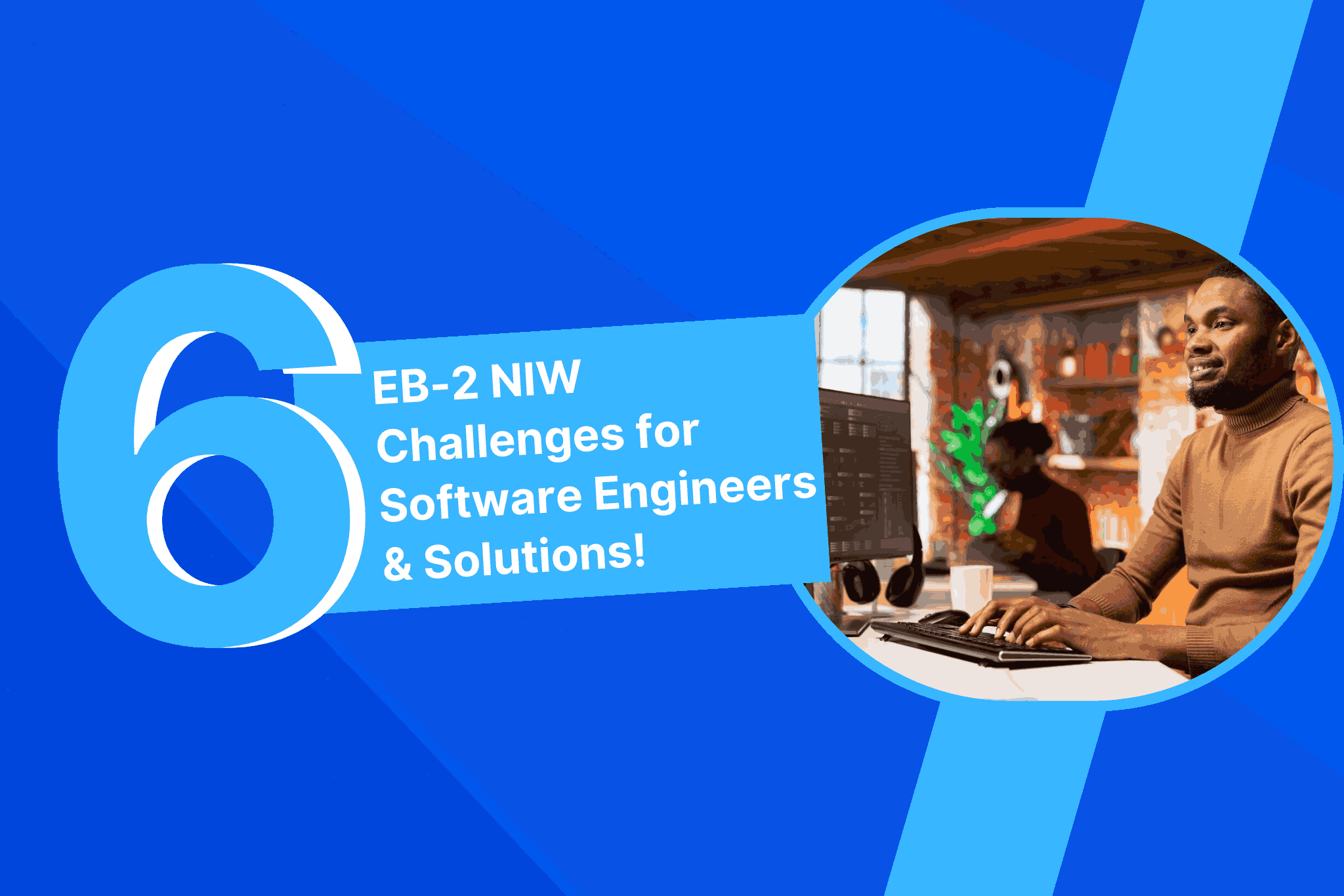Imagine spending years mastering cutting-edge technologies—AI, cybersecurity, cloud computing—only to have your EB-2 National Interest Waiver (NIW) petition denied because USCIS didn’t grasp the “national importance” of your work. Frustrating, right?
You’re not alone. Recent data shows EB-2 NIW approval rates for software engineers have dropped to 61%, the lowest in years. Despite the Biden administration’s push for STEM talent, many skilled tech professionals face unexpected roadblocks.
If you’re a software engineer dreaming of working at top U.S. tech firms like Google, Meta, or Amazon, you’ve probably heard about the EB-2 NIW (National Interest Waiver). But here’s the big question: Can a regular software engineer really qualify?
The answer is yes—but it’s not always straightforward. Many engineers assume they need Nobel Prize-level achievements to qualify, but that’s not the case. The key is strategically positioning your work to show national importance.
At VeriPass, we’ve helped hundreds of professionals, AI researchers, and cybersecurity experts secure their EB-2 NIW green cards. Below, we break down the 6 biggest challenges tech professionals face and how to overcome them.
Challenge #1: Proving “Substantial Merit and National Importance”
USCIS requires EB-2 visa applicants to show their work has broad societal impact.
But how do you prove your software engineering projects benefit the U.S. more than just another tech innovation?
Solutions:
– Connect your work to national priorities (e.g., AI for healthcare, cybersecurity for infrastructure).
– Use quantifiable metrics (e.g., “My algorithm reduced energy costs by 30% for Fortune 500 companies”).
– Cite government initiatives (e.g., CHIPS Act, National AI Strategy) to align with U.S. interests.
Example: A cloud security engineer framed their work as protecting U.S. financial systems from cyberattacks, leading to an approved EB-2 national interest waiver in 5 months.
Challenge #2: Demonstrating “Exceptional Ability” Without a PhD
Many software engineers qualify for the EB-2 NIW visa without a PhD, but USCIS still expects proof of exceptional ability.
How to Prove It:
– Patents or open-source contributions (e.g., GitHub projects with 10,000+ downloads).
– High-impact roles (e.g., leading a critical project at Google or a startup).
– Media recognition or awards (e.g., speaking at tech conferences like DEF CON).
Myth: You don’t need peer-reviewed papers—USCIS accepts real-world impact like software adoption rates.
Challenge #3: Crafting a Strong “Well-Positioned” Argument (Prong 2)
USCIS wants to see that you’re uniquely qualified to advance your work in the U.S. Many software engineers fail here because they:
– Focus only on past achievements (e.g., “I built X app”) instead of future plans.
– Lack expert recommendation letters from industry leaders.
Fix It Like This:
“My AI fraud-detection system saved Bank X $5M annually. With U.S. resources, I’ll expand this to protect 10,000+ small businesses.”
Pro Tip: Get recommendation letters from professors, CTOs, or cybersecurity experts—not just your manager.
Challenge #4: Handling Increased USCIS Scrutiny (2025 Updates)
Since 2025, USCIS has tightened EB-2 NIW adjudications, especially for tech workers. Key changes:
– Stronger emphasis on social impact (e.g., AI ethics, green tech).
– More denials for “generic” software roles (e.g., “full-stack developer”).
How to Adapt:
– Align with Biden’s STEM priorities (e.g., quantum computing, climate tech).
– Avoid vague claims—instead of “improving software,” say “reducing data center carbon emissions by 40%.”
Challenge #5: Overcoming the “Employer Dependency” Myth
A common EB-2 NIW visa misconception is that you need a U.S. employer sponsor. False!
– EB2 visa requirements allow self-sponsorship——you just need to prove your work benefits the U.S.
– Freelancers, founders, and remote workers can qualify.
Case Study: A self-taught AI researcher with no U.S. job offer secured an EB-2 visa by proving his open-source AI models were used by U.S. universities.
Challenge #6: Avoiding Costly Denials (Reddit’s Biggest EB-2 NIW Mistakes)
Many software engineers waste $5,000+ on denied EB-2 NIW petitions due to:
– Weak recommendation letters (e.g., from colleagues instead of experts).
– No clear “national interest” link (e.g., “I write code” vs. “My code secures U.S. hospitals”).
– Ignoring USCIS policy updates (e.g., 2025’s focus on economic and security impact).
How VeriPass Helps You Win:
– Personalized legal strategy tailored to your niche (AI, fintech, cybersecurity, etc.).
– Strong recommendation letters from industry leaders.
– Proven success rate—90% of our EB-2 NIW cases are approved.
Now see this. In fact, Attorneys hate to hear it. In April 2025, Veripass will be revealing:
• How to identify your strongest visa EB-2 path in 20 minutes
• How to make ordinary qualifications look extraordinary
• How to structure your case for automatic approval
237 success stories. 100% free. 4 transformational days. REGISTER NOW!
If you’re a software engineer, AI expert, or cybersecurity specialist, the EB-2 NIW green card could be your fastest path to a green card—without employer sponsorship.
But…
– You must prove national impact.
– You must avoid common USCIS pitfalls.
Ready to take the next step? Book a FREE Strategy Call with VeriPass to see if you qualify.
FAQs
1. Will software engineers be needed in 2030?
Yes, software engineers will remain in high demand due to advancements in AI, cloud computing, cybersecurity, and automation. The U.S. Bureau of Labor Statistics projects strong growth in this field.
2. What is the approval rate for EB-2 NIW?
The approval rate varies but is generally around 80-90% for well-prepared cases. Strong evidence of national impact improves chances.
3. Are software engineers eligible for EB-2 NIW?
Yes, if they demonstrate that their work has substantial merit and national importance (e.g., AI, cybersecurity, or critical infrastructure contributions).
4. What are the two key challenges facing software engineering?
– Rapid technological change requiring continuous upskilling.
– Cybersecurity threats demanding robust software solutions.
5. What is the rejection rate for EB-2?
Rejection rates vary, but poorly documented cases may face 10-20% denial rates. Strong petitions with clear evidence have higher approval odds.
6. How many citations do you need for an EB-2 visa?
No fixed number, but 50+ citations (or fewer with high-impact work) can strengthen an EB-2 NIW case. Quality matters more than quantity.
